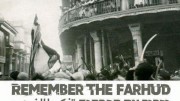 It can be frustrating warning people who are too stubborn to listen. But it is vital that warnings continue to be given.
It can be frustrating warning people who are too stubborn to listen. But it is vital that warnings continue to be given.
Here is a brilliant piece from the counterjihadist Citizen Warrior. In it the author draws frightening parallels between the story told by the Shoah survivor Elie Wiesel, of how his childhood village was warned about the evil of the Nazis, but chose not to listen. The villagers dismissed a man called Moishe who was an eyewitness to a massacre of Romanian Jews, as mad, and they refused to heed the warnings that the eyewitness kept giving. Moishe had seen and felt the barbarity of the Nazis but none of those whom he warned believed him or wanted to believe him.
We must keep on warning about the dangers inherent in the ideology of Islam, even if it does feel frustrating at times. To do otherwise would be signing our own death warrants.
So when Moishe or someone like him knocks on your door and warns you of an impending storm, do not dismiss the warning as the ravings of the mad. Those who thought that Wiesel’s Moishe was mad paid with their lives. Future warnings about unweatherable storms must not be ingnored or dismissed and neither must we turn away from uncomfortable truths about threats.
“If you haven’t read the powerful book, Night, by Elie Wiesel, you really should. It is his account of what happened to him during WWII. He was a young teen living in a small village in Hungary when, in 1942, the Hungarian police arrived to announce that all foreign Jews had to leave. The police loaded them all into trains and took them away.
The people in the town were disturbed, of course. It was a sad day. But after a few months, the memory began to fade, and life eventually returned to normal. They felt they were far enough removed from the war that it would end before it ever came to their remote village.
Then one day, one of those foreign Jews found his way back to the village. His name was Moishe. He was an old man, but the young Elie Wiesel had known him fairly well. Moishe had an extraordinary story to tell. He said when the trainload of Jews crossed the border into Polish territory, the Gestapo loaded them into trucks and took all the Jews into a forest where they were forced to dig huge trenches, and then they were all shot! Moishe himself was shot in the leg and left for dead. But he escaped and had been struggling to get back to the little village so he could warn people of what happened. He was urging everyone to flee; to get away before the Germans came.
He went “from one Jewish house to the next,” wrote Elie Wiesel, “telling his story…” And he repeatedly and urgently told his story at the synagogue.
But nobody believed him.
They thought he must have lost his mind. Why would the Germans just kill Jews like that? Germany was a modern, industrialized, enlightened country. They wouldn’t simply murder people so heartlessly and for no reason. Moishe must have lost his mind.
Moishe was insistent. He begged people to listen to him. He cried. He pleaded. But not one person believed him. They didn’t want to believe him, and that’s a formidable barrier to communication.”
Read the rest here
http://www.citizenwarrior.com/search?updated-max=2013-07-20T17:30:00-07:00&max-results=5
In a similar vein
https://www.fahrenheit211.net/2012/09/06/we-must-not-treat-stormtroopers-as-freedom-fighters/


